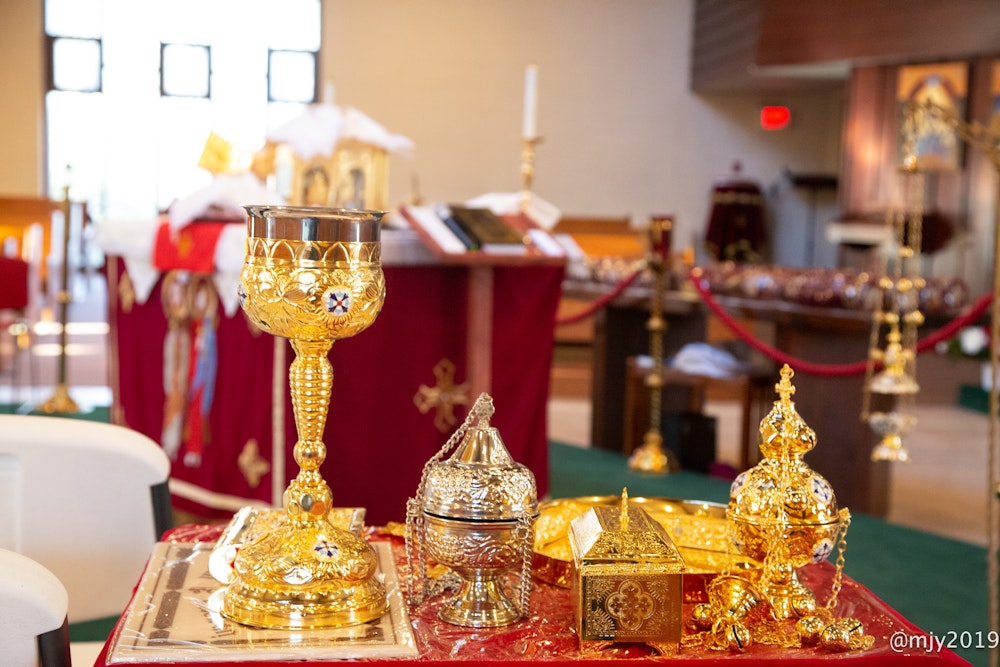United in the Sacraments, Clothed in Righteousness
In the Name of the Father, and the Son, and the Holy Spirit, One God. Amen.
May the blessing of the Father who calls us and His Only Begotten Son Jesus Christ who saves us, and the Holy Spirit who sanctifies and transforms us be with us all, that we may hear His word and bear fruit—thirty, sixty, and a hundredfold. Amen.
The Divine Liturgy: A Call to Unity
When the faithful gather in the church to partake of the Holy Mysteries, something sacred unfolds—deeper than sight, louder than words. In the holy space of the liturgy, all human distinctions dissolve. No longer are we separated by language, class, or culture. In Christ, we become one household, one family—the household of God with the saints.
We do not come as Egyptians, Armenians, Ethiopians, Eritreans, Indians, or Syrians—we come as one Church. Though our tongues differ and our chants vary, the faith we confess is one, the priesthood we stand under is one, and the sacraments we receive are one. This is the miracle of the Orthodox Church: unity in faith and diversity in expression.
“There is one body and one Spirit, just as you were called in one hope of your calling; one Lord, one faith, one baptism.” – Ephesians 4:4–5
The Liturgy is not mere tradition—it is the call to become one in heart, soul, and mind. Anba Biman, of blessed memory, taught that this unity is both a fruit of the sacraments and a holy responsibility.
In the Liturgy of St. Gregory, we plead:
“O Christ our God, establish the foundation of the Church… May the unity of love be rooted in us.”
And in the Liturgy of St. Basil, we ask:
“Make us worthy to partake of Your Holy Things… that we may be united as one body and one spirit.”
The music of the Church is not a performance—it is prayer in harmony. As the deacon chants, the priest intercedes, and the people respond, we become like an orchestra tuned to heaven, offering one hymn of love to the Holy Trinity.
Liturgical Grace: Becoming One with Christ
The sacraments are not symbols—they are real encounters. They unite us not only with Christ, but with each other. When we partake of the Eucharist, we are united with the One Body, and His righteousness is poured into our lives.
“That they may be one, as We are one.” – John 17:22
St. Augustine speaks with awe:
“To be with Christ is the chief good. Even the miserable may be where He is, but only the blessed are with Him.”
We are not simply near Christ—we are in Him, and He in us. This is not mere presence—it is communion. St. Cyril of Alexandria teaches:
“That the love with which You loved Me may be in them, and I in them.” – John 17:26
This divine love becomes our own when we receive the sacraments in faith.
Unity in Oriental Orthodoxy: One Faith, One Cup
In the Oriental Orthodox Church, we are separated by lands and languages, but bound by one unshakable faith. The Holy Trinity, the apostolic priesthood, the mystery of the Cross, the Eucharist, and the doctrinal faith of the Councils—these unite us far more deeply than anything earthly could divide.
Our unity is not cultural—it is sacramental. It is not human—it is divine.
As St. Basil prays:
“That we may be united as one body and one spirit… and have a share and inheritance with all the saints.”
The Church: A Living Icon of Unity
In the liturgy, we see what the Church truly is—not a structure, but a living mystery. The priest prays, the people respond, and the Holy Spirit descends. Even the simple response “And with your spirit” becomes a holy echo of Christ’s own unity with the Father.
St. Paul urges:
“Be kindly affectionate to one another… rejoicing in hope, patient in tribulation, continuing steadfastly in prayer.” – Romans 12:10–12
Unity isn’t automatic. It must be preserved against ego, gossip, pride, and politics. If we treat the Church like an institution rather than a communion, we trade grace for conflict.
Late Anba Biman reminds us: every liturgy is a cry for unity. Each moment—from the Kiss of Peace to the final Amen—mirrors the prayer of Christ:
“Father, I desire that they also whom You gave Me may be with Me where I am.” – John 17:24
The Root of Division: Forgetting Our Goal
Division begins when we forget our goal: to worship, not to dominate; to unite, not to control. When church life becomes about meetings and management, and not about grace and communion, we lose our anchor.
Even the apostles disagreed—Paul and Peter differed. But they remained one, saying:
“It seemed good to the Holy Spirit, and to us.” – Acts 15:28
The Holy Spirit only works in humble hearts and united minds.
Practical Practices for Unity
- Attend the Liturgy with intention. Don’t just come to church—come to be changed.
- Confess regularly. Sin divides; confession heals. It restores righteousness and unity.
- Forgive and reconcile. Don’t let resentment poison the Body of Christ. Bear one another’s burdens.
- Serve together. When we labor together in love, the Spirit knits us together.
- Pray for one another. Prayer for others softens your heart and binds the Church in peace.
Final Reflection: The Church—Heaven on Earth
Christ didn’t pray that we would agree on everything. He prayed that we would be one, as He is one with the Father. The liturgy is the answer to that prayer. It is heaven on earth.
Through the sacraments, Christ is not just near us—He is in us.
“That the love with which You loved Me may be in them, and I in them.” – John 17:26
This is the mystery. This is the righteousness we receive—not earned, but given. This is the unity we are called to live.
Let the Church never become a place of opinion and power, but a dwelling place of peace, where all say:
“It seemed good to the Holy Spirit and to us.” – Acts 15:28
May the Lord bless us, transform our hearts and minds, that our homes may stand on the Rock, our hands serve in the harvest, and our hearts long for Heaven. Amen.

